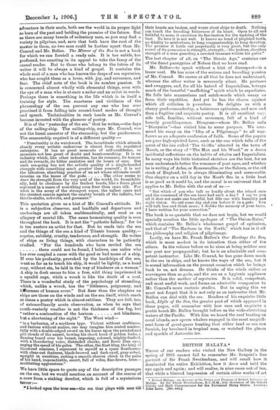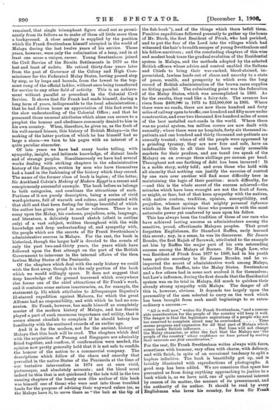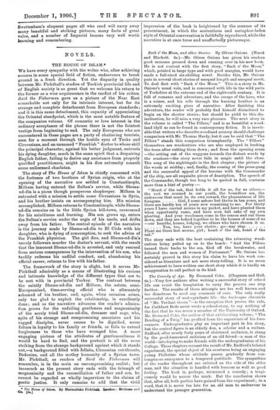BRITISH MALAYA.* THOSE of our readers who visited the New
Gallery in the spring of 1905 cannot fail to remember Mr. Sargent's fine portrait of Sir Frank Swettenham, and will recall how it dominated the entire Exhibition, bow it drew and held the eye again and again; and will realise, in nine cases out of ten, that while a blurred impression of certain other works of art • British Malaya : an Account of the Origin and Progress of British Influence in Malaga. By Sir Frank Ehvottenhani, K.C.IK.G., late Governor of the Straits Colony and High Commissioner for the Federated Malay States. London s John Lam. Des. net.]
remained, that single triumphant figure stood out so promi- nently from its fellows as to make of them all little more than a background. A close analogy is supplied by the position which Sir Frank Swettenham himself occupied in the world of Malaya during the last twelve years of his service. Those years, however, were only the culmination of a long, and in at least one sense a unique, career. Young Swettenham joined the Civil Service of the Straits Settlements in 1870 as the last and least of cadets. He retired thirty-four years later from the post of Governor of the Colony and High Com- missioner for the Federated Malay States, having passed step by step, or by leaps and bounds, from the lowest to the top- most rung of the official ladder, without once being transferred for service to any other field of activity. This is an achieve- ment without parallel or precedent in the Colonial Civil Service. It shows that Sir Frank had made himself, during a long term of years, indispensable to the local administration ;
that he had driven home an appreciation of this fact even to
the slow understanding of the Colonial Office ; and that he possessed those unusual attributes which alone can secure to a prophet the honour and obedience commonly denied to him in his own country. When, therefore, he gives us, as the fruit of his well-earned leisure, this history of British Malaya—in the making of the latter portion of which he has himself had so large a share—we turn to his pages with an interest of a quite peculiar character.
Of late years we have had many books telling, with sympathy, insight, and intimate knowledge, of distant lands
and of strange peoples. Simultaneously we have had several works dealing with striking chapters in the administrative history of the Empire, written by men who have themselves had a hand in the fashioning of the history which they record. The name of the former class of book is legion; of the latter, Sir Auckland Colvin's Making of Modern Egypt is a recent and conspicuously successful example. The book before us belongs to both categories, and combines the attractions of each.
Portions of it are purely descriptive, being a series of vivid word-pictures, full of warmth and colour, and presented with that skill and that keen feeling for things beautiful of which the author has given proof in earlier volumes. There is an essay upon the Malay, his customs, prejudices, arts, language, and literature, a delicately traced sketch (albeit in outline only) of a vast subject, written throughout with the wide knowledge and deep understanding of, and sympathy with, the people which are the secrets of Sir Frank Swettenham's administrative success in Malaya. For the rest, the book is historical, though the larger half is devoted to the events of only the past two-and-thirty years, the years which have followed upon the first attempt on the part of the British Government to intervene in the internal affairs of the then lawless Malay States of the Peninsula.
Of the chapters which deal with the early history we could wish the first away, though it is the only portion of the book which we would willingly spare. It does not suggest that deep knowledge of the ground traversed which everywhere else forms one of the chief attractions of Sir Frank's work, and it contains some serious inaccuracies, as, for example, the statement (p. 15) which attributes to Albuquerque Siqueira's ill-starred expedition against Malacca, for which the great Alfonso had no responsibility, and with which he had no con- nexion. Sir Frank, however, has made himself so completely master of the modern history of Malaya, and has therein played a part of such enormous importance and utility, that it seems almost churlish to complain if he should betray less familiarity with the scattered records of an earlier age.
And it is for the modern, not for the ancient, history of Malaya that this book will be read. The chapters which deal
with the acquisition of Penang and Singapore are admirably fitted together, and confirm, if confirmation were needed, the opinion now pretty generally held that it is not safe to confide the honour of the nation to a commercial company. The descriptions which follow of the chaos and anarchy that prevailed in the native States of the Peninsula at the time of our tentative intervention in 1874 are at once vivid, picturesque, and absolutely accurate ; and the blood must indeed be thin that is not quickened by the tale told in the two
ensuing chapters of the lonely men (the author of this book was himself one of them) who were sent into those troubled lands for the purpose of advising their wayward rulers (or, as the Malays have it, to serve there as "the bait at the Up of
the fish-hook "), and of the things which there befell them. Punitive expeditions followed presently to gather up the bones of Mr. Birch, the first Resident of Perak, who had perished, and to put the fear of the Lord into the villages which had witnessed the hair's-breadth escapes of young Swettenham and
his fellow-survivors ; and the concluding chapters of this wise and modest book trace the gradual evolution of the Residential system in Malaya, and the methods adopted by the selected
British officers whose advice and control enabled the Sultans and Chiefs to bring their war-racked, blood-stained, im- poverished, lawless lands out of chaos and anarchy to a state of peace, wealth, and prosperity to which even the long record of British administration of the brown races supplies no fitting parallel. The culminating point was the federation of the Malay States, which was accomplished in 1896. As for the results, they read like a fairy-tale. The revenue has risen from $409,090 in 1875 to $23,900,000 in 1905. Where there were no roads, there are now three hundred and forty miles of railway open to traffic, one hundred and fifty more under construction, and over two thousand five hundred miles of some of the best metalled cart-roads in the world. Where there was no postal system, ten million covers are now dealt with annually; where there were no hospitals, forty-six thousand in- patients and one hundred and thirty thousand out-patients are annually treated; where of old the people were oppressed by a grinding tyranny, they are now free and safe, have an indefeasible title to all their land, have easily accessible markets for their produce, and are taxed (we speak of the Malays) on an average three shillings per annum per head. Throughout not one farthing of debt has been incurred ! It is a noble story, nobly told; and even those who hold with all sincerity that nothing can justify the exercise of control by one race over another will find some difficulty here in maintaining the logic of their position : much difficulty, for —and this is the whole secret of the success achieved—the miracles which have been wrought are not the fruit of force, or might, or fear, but of that keen sympathy with the natives, with native custom, tradition, opinion, susceptibility, and prejudice, whence springs that mighty personal influence which in the East invests those who possess it with the most autocratic power yet conferred by man upon his fellow.
This has always been the tradition of those of our race who have achieved lasting success as administrators among the sensitive, proud, affectionate Malayan peoples. That great forgotten Englishman, Sir Stamford Raffles, early learned this secret ; nay, in a sense, he was its discoverer. Sir James Brooke, the first Rajah of Sarawak, attributed to the example set him by Raffles the major part of his own astounding success among the Malays of Borneo. Sir Hugh Low, who was Resident of Perak from 1877 to 1889, had in his youth been private secretary to Sir James Brooke, and he re- imported the secret of administrative work among Malays, inherited from Raffles, into the Malay States. Swettenham and a few others bad in some sort evolved it for themselves; but Low's influence, during the first decade that the Residential system was on its trial in Malaya, did much to quicken their already strong sympathy with Malays. The danger of all this is, however, obvious. It depends too largely upon the personality of the men selected to carry on the work which has been brought from such small beginnings to so extra- ordinary a success :—
"All is well now," writes Sir Frank Swettenham, "and a reason- able consideration for the people of the country will keep it well. The danger is that the legitimate aspirations of a people who are too reserved to complain aloud may be overlooked. Time means progress and expansion for all that part of Malaya which comes under British influence But time will not change the Malay character, or alter the fact that the Malays are the people of the country' whose confidence we have gained by making their interests our first consideration."
For the rest, Sir Frank Swettenham writes always with force, sometimes with humour, very often with charm, with delicacy,
and with finish, in spite of an occasional tendency to split a hapless infinitive. The book is beautifully got up, and is lavishly illustrated with reproductions of photographs. A good map has been added. We are conscious that space has prevented us from doing anything approaching to justice to a book which is, as we have said, one of quite unusual interest by reason of its matter, the manner of its presentment, and the authority of its author. It should be read by every Englishman who loves his country, for from Sir Frank
Swettenham's eloquent pages all who read will carry away many beautiful and striking pictures, many facts of great value, and a number of Imperial lessons very well worth learning and remembering.
































































 Previous page
Previous page